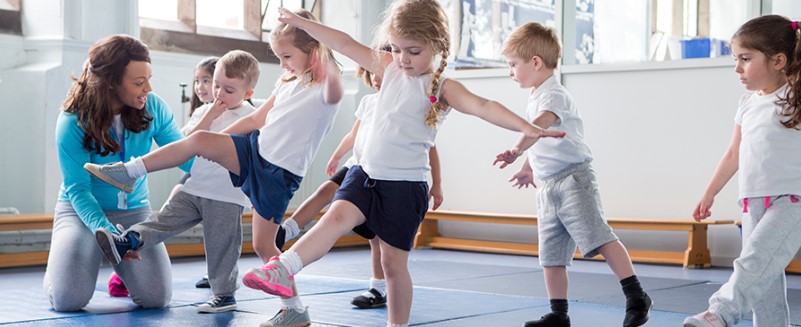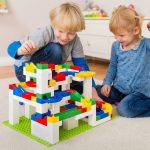Table of Contents
Starting school is a big step for both the parent and the child. So what can you as a parent do to ensure your child is prepared and limit the potential for tears from both of you on the D-day?
Below is a great guide that will help you know how to properly prepare the child for their first day of school.
Start by getting the child to be familiar with the general idea of school…
You can read them storybooks like Starting School by Janet and Allan Ahlberg’s or I am Too Absolutely Small for School written by Lauren Child. This will provide you a way to engage with the child and helps in creating a positive impression of what school is about. Doing this can also help the kid raise any concerns he/she might be having (you should also remember they might ask something that seems silly to grown-ups, and this can range from where can I find the loo? Or how can I find my way back home?) You should also consider asking older friends and cousins to chat them up about the fun things they do at school (provided they don’t bring up anything negative like assemblies being boring or someone thumping them when playing)
You can also bring in the happy memories you have about school (provided you have them). This can include the games you used to play and how you liked your first teacher.
You should be very careful with your words because you can accidentally bring up worries that the child did not have before and also try not to pass your own anxieties to the child.
… And with the prospective classmate and also the school
When walking or driving past appealing features, point it out. I saw the way the eyes of my child lit up after showing him the cool playground and the bog field where he could play as much football as he wanted.
Attendance of any settling-in sessions. This will be a little harder for people who are working, but this is a good opportunity for you and your child to know more about the teacher, classroom, classmates, and find out where the important things such as loos are.
If there is a prospective classmate you know about, you can decide to plan a meet-up over summer so that they will have a familiar face on their first day at school.
Primary school children
WHAT DOES THE CHILD NEED TO KNOW
The main worry of many parents is that their kid will be the only one who won’t be able to tell an A from a Z or write down their name. This should not be the case because it doesn’t matter.
The teachers will not be expecting the children to know numbers and letters, and this is the main reason why they are in school. The things they focus more on are the practical ‘self-care’ skills.
They will be glad if the child can:
- Go to the loo on their own and also clean up themselves when they are done, including washing hands.
- Putting their coat on and changing for PE. The teachers or assistant will help them if they have any problem with buttons or zip.
- Recognize their name so they will be able to know whether they coats are theirs or not. Failing to do this can mean the clothes disappearing or being thrown into the lost property bin.
- Eat without any problem and even use cutlery (many of the schools usually help kids by chopping foods)
- Have the ability to share, listen, and being quiet or sitting still for a short period of time when asked to.
PRACTICALITIES
If you go to work or planning to go back to work and the time is beyond the school hours, you will need to do a little planning for childcare immediately. A good option for after-school care are childminders �” you can get the list of registered childminders from the local council. You can pick the list from there or ask the school office.
If you don’t have the details of settling-in arrangements or uniform list, then you should make an effort contacting the school before the start of the summer holidays because the office will be closed after that until September.
THE TEACHER’S HOME VISIT
Many people will most likely go into a frenzy of cleaning when there is something like this. This is where the teacher pays a visit to your home. This has continued to be common over the years, although not all schools are doing this. It will usually involve a teacher alone or with an assistant coming over to see you and your child in your home for a short period of time. This is usually before the beginning of the term.
In the real sense, this is where the teacher will get to know more about your child and the family.
This will help in building the link between home and school which is the relationship between the teacher and the parent, and this is according to Joanna Fleming, a teacher from Cumbria. This provides the perfect chance to see things and provide an explanation on any worries you or your child might be having.
There is also the chance of a teacher seeing the child in their own environment, which is when they are the most comfortable. If the child becomes shy in the classroom but was not when the teacher visited at home, the teacher will know that the child needs to come out of their shell more.
Now to a more important question: do teachers care if the home is not the cleanest it can be, like crumbs on the floor or discarded toys?
Joanna reassures parents that they are not there to see whether the house is tidy or not, but it can be nice if they do it. They also like it when the parents turn off the TV, and if it is left on, the volume should be turned down a little bit.
Anna Plasett is a mother of two and she is from North London. Her daughter Ella’s teacher came to pay them a visit in September before the start of reception, is of the view that preparations should be kept low key. She said she did not turn to a maniac trying to tidy up or bake because it would have made her daughter nervous. She also recommends getting someone to come look over the other siblings during the visit. This is done so that they don’t take attention away from the child being visited. Here are some home visit tips:
DO
- View this as a chance to get someone-on-one time to get to know the teacher better and the teacher to know you.
- Be aware of the changes in schooling – this post from Tradewind will provide insight.
- Use the visit to bring up any concerns you might be having e.g. development, toileting, and any other issues. This is much easier to do when you are alone than trying to get her attention when you are in the room with many other parents.
- Try explaining to your child that the teacher is coming over and they should say hello and also show them their favorite toy.
- Turn off the TV. It will be hard for your child to bond with the teacher if there is going to be distractions from the TV.
- Offer the teacher tea and biscuits
DON’T
- Worry yourself trying to make your house look super clean. You can go ahead and do a quick clean up if it is going to make you feel better.
- Bribe the child to behave – they can easily blurt it out “Mum I want the candy you promised me if I was good to the teacher”
- Keep trying to tell the teacher how much of a genius your child is. If you think they are ahead of the game, then you can mention it but it should be brief. The school will be able to do their own assessment in order to determine this.
- Remember that the teacher will not be able to stay for a long period of time because they have other homes to visit.
















